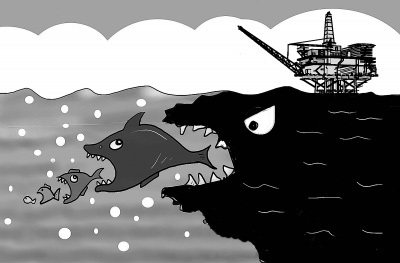(Ecns.cn)--With over one-fifth of its water polluted and most of its marine life in grave danger, China's only semi-enclosed sea―the Bohai―is dying. The recent oil spills, for which every party involved is trying desperately to shirk responsibility, have served to vividly illustrate the causes.
The spills began in early June and have unleashed a nationwide outcry over how ConocoPhillips China (COPC),which operates a venture in Bohai Bay with the state-owned China National Offshore Oil Corporation (CNOOC),has handled the emergency plugging and cleanup.
An investigation by COPC revealed that the leak released about 700 barrels of oil into the bay and 2,500 barrels of mineral oil-based drilling mud, which is used for lubrication, onto the seabed. All but a small fraction of that oil and mud has been recovered.
However, data from the State Oceanic Administration (SOA) showed that about 5,500 square kilometers of water has been polluted by the spills, accounting for about 7% of the total Bohai area.
Evasive attitudes
Bombarded, COPC rejected accusations of negligence by state media after a three-month battle to contain the spill, saying that it had already submitted a report to the SOA and had acted promptly to staunch the seepage.
COPC stated Monday that it had complied with a government order to suspend all drilling, water injection and production at the affected Penglai 19-3 oil field, one of China's biggest.
The company had stressed that the geological faults should partially be to blame for the accident. But experts called it an excuse, believing that the company should have known the geological conditions and taken precautions before conducting operations.
However, the delayed response by the SOA also contributed to the large-scale contamination, revealed an expert.
The SOA can hardly absolve itself from blame, reported Century Weekly, and should offer the public an apology.
According to various attorneys, the government should apologize to the public as soon as there are serious accidents, regardless of who finally shoulders the responsibility. However, the SOA has yet to take any such action.
Moreover, many experts believe that the CNOOC should not keep itself out of the incident, as the public becomes increasingly puzzled by the liability the state-run firm should bear.


















